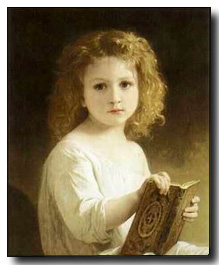The Virtue of Innocence
- DONALD DEMARCO
"How many of you are 'pro-choice'?" she asked her grade school pupils. Immediately, all hands shot up, except one.
 |
"Because
my Mommy and Daddy are pro-life," was the youngsters firm reply. But her stern
examiner had not yet completed her line of inquiry. "Suppose your parents were
morons?" "Then," said the little girl, and quite emphatically, "Id be pro-choice."
Mere words
The teachers attempt to discredit her pupils basis for holding a pro-life position obviously backfired. By unintentionally implying that only morons are pro-choice, the child exploited her teachers logic to her own advantage. This exchange, which actually took place at a Toronto elementary school, is a parable for the unworkability of the "pro-choice" rhetoric. The childs words are far wiser than she could possibly have suspected.
Having loving parents is not a bad basis for being "pro-life." By contrast, having a manipulative teacher is not a good basis for being "pro-choice." By listening to her parents, the young girl was responding to people who, in turn, formed their "pro-life" convictions by responding to a reality, namely, the human value of unborn human life. Her conforming colleagues, however, were not responding to a reality as much as reacting to a word. Who would not be in favor of choice?! Who would not be in favor of green? But a green face! Everyone loves a surprise, until it reveals itself to be terribly bad news.
The "teacher," who apparently is willing to abandon pedagogy for demagoguery, does not inform her students what the particular choice of abortion actually entails. Had the teacher asked, "How many of you are in favor of removing all rights to life from unborn babies so that their own mothers are free to kill them?" one would suppose that no normal seven-year-old could possibly endorse such a thoroughly heartless position. Being "pro-choice" can be maintained only by suppressing reality, while reacting, instead, to the sweet sound of certain abstract words. As in advertising, what is sold is not the steak but the sizzle. Life Is Not a Dream
I have just finished reviewing Michael Schooyans new book, The Totalitarian Trend of Liberalism. The author is a professor at the University of Louvain, Belgium, and has had a brilliant and eventful academic career. Although his book is highly technical and represents a great deal of research, the main point is very much in harmony with our seven-year-olds outlook. Just as the ideology of choice uses words to evoke dreams, so does the ideology of liberalism. Choice draws us into fantasy; life leads to reality. Liberalism is a world suspended from the gritty facts of reality, whereas liberty is an important dimension (though certainly not the only one) of human existence. Thus, Schooyans labors to show us that we should use our liberty realistically, in the service of life, and not employ a smokescreen of liberal ideology to avoid it.
Grade-school children should be fed fairy tales, not ideologies. The former are infinitely more realistic. A good fairy tale will always make sure to include some frightfully wicked individual (whose iniquities cannot be justified on the basis of choice alone). Reality is full of them, and the wise student will come to realize that dealing with reality demands a great deal of courage and various other virtues. But an ideology, such as the one pro-choicers proselytize, invites people to withdraw into a dreamworld where they imagine that everyone is free and no one is ever constrained. In such a frictionless world, how could one ever determine whether anyone is a moron? Could we determine that anyone is a moron apart from how he relates to an undebatable reality? Could not a real moron — if he were well-coached — always excuse his peculiar behavior simply by claiming that he is "pro-choice"?
In a world of
choice without measure, how could we find justification for calling even a moron
a "moron"?
Get real
Dreams are popular because they are undemanding. But a good teacher does not want his students to fall asleep in class. Realities, on the other hand, are unpopular precisely because they are demanding. Yet the very purpose of education is to prepare students so that they can better meet the rigorous demands of reality. Life is challenging; "choice" is evasive.
Education should arouse us from a dreamlike trance in which we are mesmerized by agreeable, though unrealistic, thoughts. In this regard, returning to our opening anecdote, the roles are reversed. We may have more to learn, at least about "choice" and "life," from a seven-year-old girl than from her salaried and certified teacher. Out of the mouths of babes!
Did the Shepherd of Hermas, in the second century, have any inkling into how prophetic he was when he uttered these words: "Be simple and guileless, and you will be as the children who know not the wickedness that ruins the life of men."
 This is J. Fraser Field, Founder of CERC. I hope you appreciated this piece. We curate these articles especially for believers like you.
This is J. Fraser Field, Founder of CERC. I hope you appreciated this piece. We curate these articles especially for believers like you.
Please show your appreciation by making a $3 donation. CERC is entirely reader supported.

Acknowledgement
DeMarco, Donald. "The Virtue of Innocence." Lay Witness (Jan/Feb. 1999).
Reprinted with permission of Lay Witness magazine.
Lay Witness is the flagship publication of Catholics United for the Faith. Featuring articles written by leaders in the Catholic Church, each issue of Lay Witness keeps you informed on current events in the Church, the Holy Father's intentions for the month, and provides formation through biblical and catechetical articles with real-life applications for everyday Catholics.
The Author




